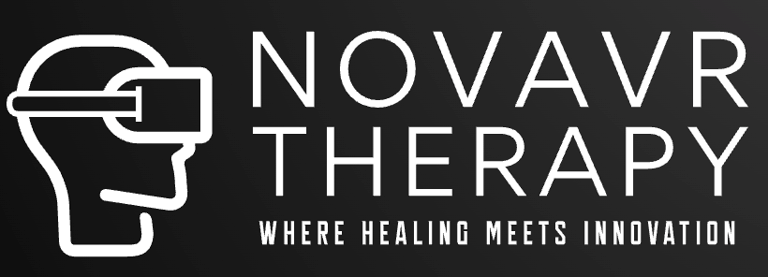Step into the future of counselling & psychotherapy in Ottawa with NovaVR’s immersive VR therapy. Call today for a free consultation: (613) 501- 2175
Understanding the Differences: Counselling, Psychotherapy, and Psychiatry in Ontario
In the field of mental health in Ontario, it is essential to understand the differences among counselling, psychotherapy, and psychiatry, as each serves a unique purpose and employs distinct methodologies. Counselling is typically focused on providing support and guidance to individuals facing personal challenges, life transitions, or relationship issues. The primary goal of counselling is to facilitate personal development, enhance coping skills, and foster self-awareness through structured conversations between the client and the counsellor. Common situations prompting individuals to seek counselling may include stress management, career guidance, or family conflicts.
NOVA VR THERAPY
Athem Houssein
5/19/20256 min read


Defining Counselling, Psychotherapy, and Psychiatry
In the field of mental health in Ontario, it is essential to understand the differences among counselling, psychotherapy, and psychiatry, as each serves a unique purpose and employs distinct methodologies. Counselling is typically focused on providing support and guidance to individuals facing personal challenges, life transitions, or relationship issues. The primary goal of counselling is to facilitate personal development, enhance coping skills, and foster self-awareness through structured conversations between the client and the counsellor. Common situations prompting individuals to seek counselling may include stress management, career guidance, or family conflicts.
Psychotherapy, on the other hand, delves deeper into emotional and psychological issues, often addressing more complex mental health conditions. Psychotherapists utilize various therapeutic techniques, such as cognitive-behavioral therapy or psychodynamic therapy, to help clients explore their thoughts, feelings, and behaviors. The aim of psychotherapy is often to foster significant change in an individual's emotional functioning or to alleviate symptoms of mental health disorders. These sessions are generally longer-term and may address unresolved trauma or chronic psychological issues.
Finally, psychiatry integrates medical knowledge and psychological principles. Psychiatrists are medical doctors who specialize in diagnosing and treating mental illnesses through a combination of medication management and therapy. Their unique training allows them to prescribe medications and add a pharmacological perspective to the treatment of mental health conditions. Patients may seek psychiatric support for a range of disorders, including depression, anxiety, or bipolar disorder, especially when pharmacotherapy is indicated in conjunction with therapy. Understanding these definitions enables individuals to identify the most suitable path for their mental health needs, guiding them toward appropriate care.
The Differences in Approaches and Techniques
When comparing counselling, psychotherapy, and psychiatry, it is essential to understand that each discipline employs distinct approaches and techniques tailored to different therapeutic goals. Counselling, often short-term and solution-focused, typically aims to address specific issues such as stress management, relationship problems, or personal development. Counsellors provide support and guidance, helping clients identify and implement strategies to cope with immediate challenges. Their methods frequently involve active listening, empathetic engagement, and practical advice, making it accessible for those seeking help with more compressed concerns.
In contrast, psychotherapy delves into the deeper layers of an individual's emotional and psychological well-being. This process may take longer and is designed for exploring more complex and enduring issues such as depression, trauma, or anxiety disorders. Psychotherapists utilize various techniques, including cognitive-behavioral therapy (CBT), psychodynamic therapy, and humanistic approaches. By fostering an environment for introspection, these professionals assist clients in uncovering underlying patterns from their past experiences that may influence their current behavior and thought processes. Such an exploration can lead to profound insights and long-term personal change.
Psychiatry, distinctly different from both counselling and psychotherapy, encompasses a medical approach to mental health. Psychiatrists are licensed medical doctors who can diagnose mental illnesses and prescribe medications as part of treatment. Their techniques often include a comprehensive evaluation of a patient’s medical history, followed by recommendations for medication management or referrals to psychotherapy for ongoing support. This dual approach focuses on addressing mental health disorders from both physiological and psychological perspectives, targeting symptoms more aggressively in some cases.
Overall, understanding these differences in approaches and techniques clarifies the unique roles counselling, psychotherapy, and psychiatry play in promoting mental health, facilitating informed decisions for those seeking support.
Qualifications and Credentials of Practitioners
In Ontario, the qualifications and credentials for professionals engaged in counselling, psychotherapy, and psychiatry are critical to ensuring that individuals receive safe and effective treatment. Each profession possesses distinct training pathways, certifications, and licensing requirements that reflect its unique focus and methods of intervention.
Counsellors typically hold a minimum of a master’s degree in counselling or a related field. They may also possess additional certifications from recognized organizations such as the Canadian Counselling and Psychotherapy Association (CCPA) or the Ontario College of Social Workers and Social Service Workers (OCSWSSW). These certifications ensure that counsellors have the requisite knowledge and skills to assist clients in achieving personal development and emotional well-being. While counsellors are not regulated in the same manner as psychotherapists or psychiatrists, many choose to register with professional bodies to enhance their credibility and set ethical standards.
In contrast, psychotherapists are required to meet specific educational and registration standards to practice. In Ontario, the College of Registered Psychotherapists of Ontario (CRPO) governs the registration process, necessitating a master’s degree or equivalent in psychotherapy-related fields, along with successful completion of a supervised practice program. This regulatory body not only sets the educational standards but also enforces a Code of Ethics and a Quality Assurance program, ensuring clients receive competent care.
Psychiatrists, as medical doctors, undergo the most rigorous training pathway, requiring a medical degree followed by a residency in psychiatry. Following their residency, psychiatrists must pass examinations to be board-certified in psychiatry. This thorough education allows psychiatrists to diagnose and treat complex mental health disorders, prescribe medication, and provide psychiatric evaluations. The regulatory body for psychiatrists in Ontario is the College of Physicians and Surgeons of Ontario (CPSO), which mandates adherence to high standards of medical practice.
Understanding these qualifications is crucial for clients when seeking assistance. By ensuring that practitioners possess the appropriate credentials, individuals can feel more confident in the treatment they receive.
When to Seek Each Type of Support
Determining when to seek support from a counselor, psychotherapist, or psychiatrist can significantly impact an individual's mental health journey. Each professional offers distinct approaches tailored to specific needs, making it essential to understand the appropriate contexts for each service.
Individuals may benefit from counseling when facing day-to-day challenges or transitional phases in life. Common scenarios include dealing with stress, relationship issues, or grief. Counselors typically help clients navigate these situations through structured conversations focused on problem-solving and coping strategies. If someone encounters difficulties adapting to life changes, such as a career shift, marriage, or bereavement, it is advisable to seek counseling services.
In contrast, psychotherapy is often recommended for individuals grappling with deeper emotional or psychological issues. Conditions such as depression, anxiety disorders, or trauma often necessitate a therapeutic approach that challenges underlying thought patterns and behaviors. Psychotherapy involves a more intensive exploration of feelings and past experiences to facilitate long-term change. If someone is experiencing persistent emotional pain or recurring patterns of behavior that disrupt daily functioning, they may benefit substantially from engaging with a psychotherapist.
Lastly, engaging with a psychiatrist is the best course of action for individuals experiencing severe mental health conditions, particularly when medication may be necessary. Psychiatrists are qualified to diagnose and treat disorders like schizophrenia, bipolar disorder, and severe anxiety, which may require pharmacological intervention alongside therapy. If someone is facing debilitating symptoms, such as hallucinations, suicidal thoughts, or extreme mood swings, seeking psychiatric help is crucial for effective treatment and stabilization.
Understanding the differences among these three types of mental health support enables individuals to make informed decisions, ensuring they receive the most suitable care tailored to their unique circumstances.


Athem Houssein
SOCIAL WORKER (MSW)
Rebecca Bates
SOcial Worker (MSW)
DeRoux Jones
Psychotherapist. (q)
Emily Light
Psychotherapist. (q)
Show You Care 💚
Whether you're a business, nonprofit, school, or agency, this is a simple, meaningful way to support mental health — without adding administrative burden. We'll provide everything you need to launch the benefit quickly and effectively.
You're Invited to Join the NovaVR Corporate Affiliate Program
Support your team’s mental well-being with exclusive access to discounted therapy services.
✅ Click the box below to confirm your interest and receive your corporate access package.


